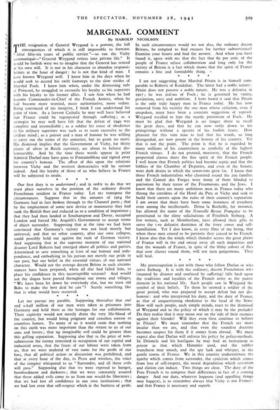* * * * My preoccupation is not with those
who follow Darlan or who serve Sieburg. It is with the ordinary, decent Frenchman who (stunned by disaster and confused by suffering) falls back upon the traditions and loyalties of the French army as the purest element in his national life. Such people saw in Weygand the symbol of their beliefs. To them he seemed a soldier of the great period, who was prepared to accept defeat but not dis- honour : and who interpreted his duty, and the duty of France, as that of unquestioning obedience to the head of the State. How will such people, such simple minds, react to the dismissal of Weygand and to the policy of which it may be the prelude? Do they realise that it may mean war on the 'side of their enemies against their friends? Will they even then continue to believe in Petain? We must remember that the French are more insular than we are, and that even the soundest doctrine becomes suspect for them if it comes from abroad. We must expect also that Darlan will enforce his policy by police-methods. Iri Deloncle and his hooligans he may find an instrument as potent as that which Himmler used, and the rubber truncheon may smash, and the spy lurk and whisper, in the gentle towns of France. We in this country underestimate the apathy which comes from surrender, the cynicism which comes from loss of self-respect, the moral degradation which terrorism and elation can induce. Two things are clear. The duty of the Free French is to compose their differences in face of a coming danger And our duty, whatever happens (and appalling things may happen), is to remember always that Vichy is not France : and that France is necessary and superb.


























 Previous page
Previous page